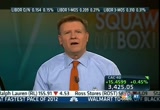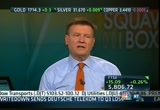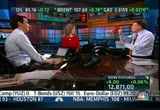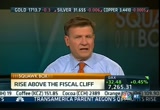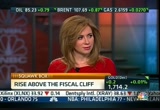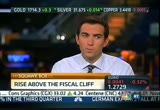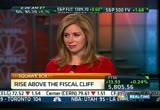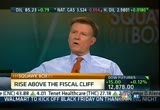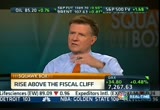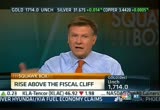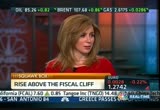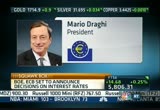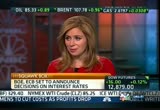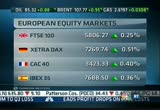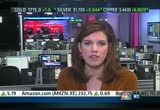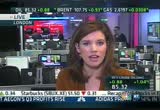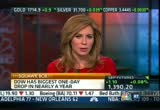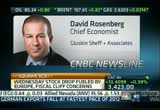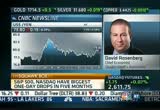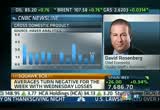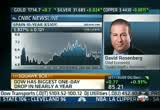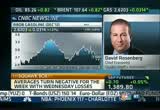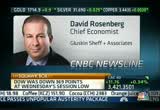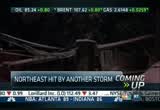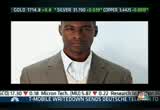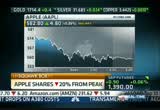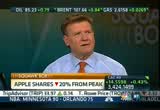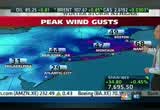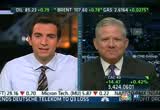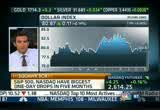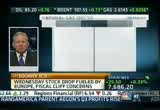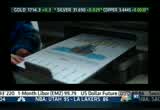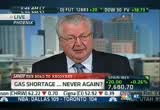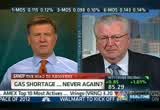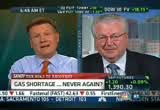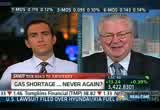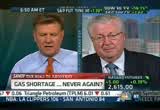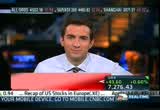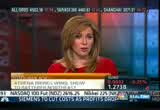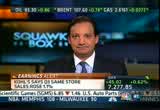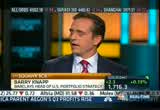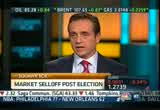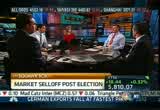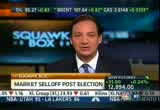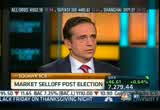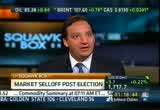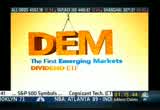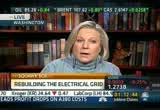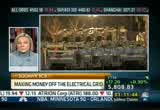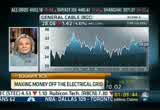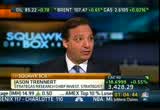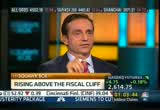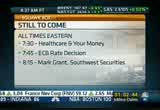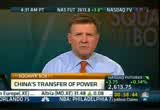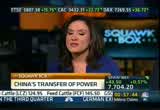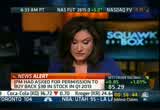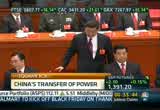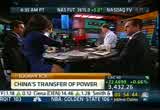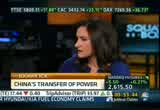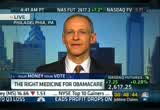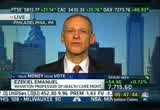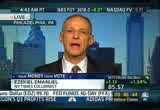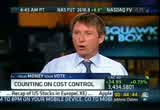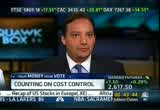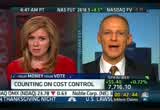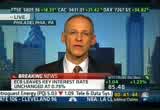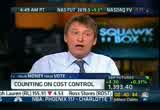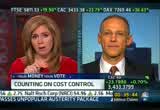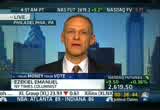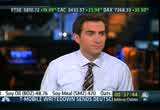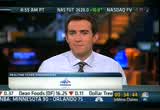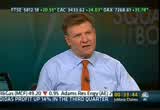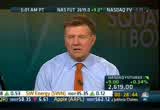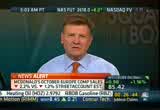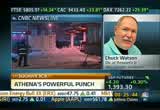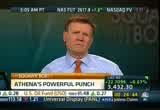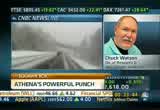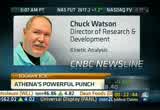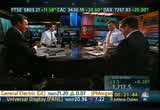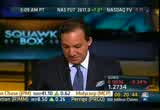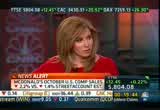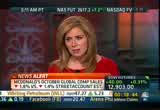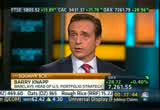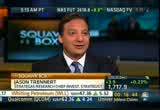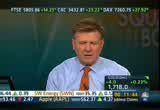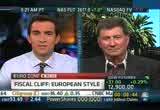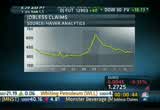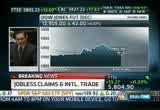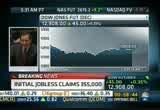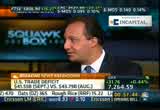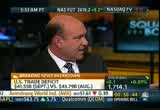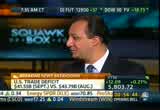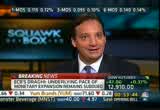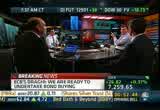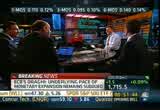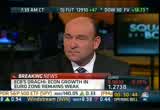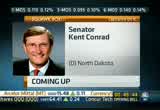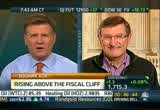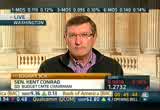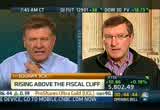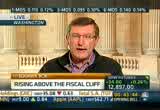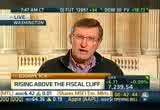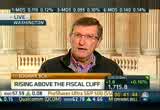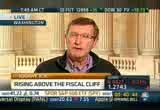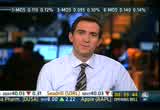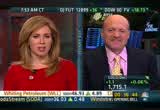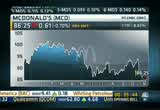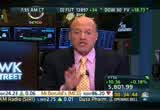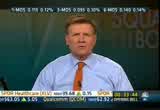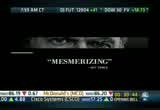tv Squawk Box CNBC November 8, 2012 6:00am-9:00am EST
6:00 am
i'm joe kernen along with becky quick and andrew ross sorkin. our top story this morning is obviously the markets. i don't remember a three handle for quite a handle. the dow closed below 13,000 -- >> biggest point drop and personal drop this year. >> for the first time below 13,000 since august. the s&p broke below 1400. all the main sectors ended firmly in the red. the worst performers were centeri energy and financials and i bet you coal didn't do any well. hmos big down. >> you know what did do well, guns. >> hospitals did well. the so-called fear gauge, and that is known as the vix, the cboe volatility index jumped. u.s. equity futures should be interesting to look at temperature basically on hold. not sure what to do after yesterday. we'll talk more about the
6:01 am
economy in a minute with david rosenburg. it was pretty clear yesterday that depending on how you wanted to spin it, could you say how do you do for another four years. i don't remember any euro news in the last six months no matter how bad it was, we didn't get it free handle. so there's more to it than just europe. >> it was the fiscal cliff, but also the financials got hit so hard. if it had been romney, the cliff would be less of a deal because they would stepped all of them. so now we know and we lettered it first hand yesterday. boehner said we're open to tax increase, but part of a bigger plan that involves spending cuts.
6:02 am
dove did a bungee -- >> worst thing i ever did. >> but it goes down and then right back up. >> the worst part is you feel like you're connected on something, but don't. it's a free fall until the very he said and then he start to feel like i'm connected to something and it throws being back into the air. >> my question is let's say that it's not a bungee, let's say it's a rope. so you jump and then you -- that would be like hanging yourself. but you do possibly survive. but then you're all the way down there and then you don't know when someone's going to pull you back up. i think it might be more like that. if we go down, we may be d dangling for a while. >> once we go over the cliff, it's much more complicated. and you get rope burns, too. >> you can it. well, that's if it's not stretchy and it's just a rope,s's more than a burn.
6:03 am
then you actually -- they pull you back up, but you're dead. and that could happen, too, the economy could be dead by the time we pull it back up. >> all tree. >> 300 point. anyway, as we mentioned among the main reason for the nearestness, the looming, which is a good word, no deal -- the cliff. if no deal is reached on 600 billion in spending cuts and tax increases, it could derail a recovery. yesterday aetna ceo told us if a solution isn't found, the u.s. economy will face dire consequences. >> the top line has to grow. if the top line doesn't grow, you have to do something about expenses. >> and he said -- you don't usually get ceos that have employees saying if we go over it, i'm laying off 10% of my workforce. >> he said he would start laying off people and in some cases you
6:04 am
could expect 10%. when we pushed him on that, he said i won't announce that here. but he said gdp would probably drop by 1 pp.7%. that translates in to a one percentage point increase in the unemployment which translates in to 100 basis points in health care cost which is means he has to lay people off. >> but i thought the suggestion was that he thinks he'll layoff 10%. >> i couldn't tell if he was saying that just as a round number or not. that would seem extreme. >> i was kidding that people were watching us with the bickering. they may not have been watching us, but it became clearer that the two sides, if one side -- and i love this. i've been talking to you about this. here's a picture of the country. and every testimony guest that we had on yesterday said it was clear mandate that the president had to raise taxes. number one, that's just a weird chart to look at.
6:05 am
democrats love water. that's all i can really take out of that. >> big cities are on the ocean. >> but to yiconvince -- they sa everybody wants to raise taxes. but to get 50% of the people to agree to raise taxes on somebody else is not that hard to do probably. but we see they'll say -- >> it sounds like with what boehner is now taking about, he's open to raising revenue through some kind of effective tax rate. >> through a bigger plan of spending -- if it's combined with spending cuts, as well. all right. let's look at john boehner and see what he had to say. >> let's rise above the disif you think and do the right thing together for our country. >> apparently there are a run on these buttons, too.
6:06 am
andrew asked how long do we have to wear these. and i said i got a tattoo. i don't think it's about -- it's right underneath here. >> i don't want to tell you where mine is. >> our says rise above. >> it's the design, too. we're not pushing either side, we're just saying, you know -- >> this is bad for the economy. >> no one like 7.9% unemployment. we don't want 8.9%. >> but the devil is definitely in the details. the former republican governor of michigan in charge of the ceo round table said the one thing boehner has to understand is that he's in the minority. you have two houses, the doesn't
6:07 am
matter, but he said you can't say it's my way or the highway. but that's what john boehner seemed to offer. >> and the point was made in the journal, sure, you can put the house in a box and say you're not getting along and get the ratings down to 1%. but if you have a recession, it didn't help you either as the president of the country or the majority party, you end up in a recession anyway, everybody will get -- >> but you'd like to see both side comes to the table. >> but the guys still in the house are not going to give -- and boehner, i don't even know if boehner can -- he can't make a promise he can't deliver on. >> they won't do anything until later this month after you get through the party caucuses. >> the most interesting story i saw this morning, a political story about the role of paul ryan in all of this and whether he will be able to work with
6:08 am
boehner on this and whether he has to take a hard position against boehner. >> and whether eric cantor will go along with whatever plan boehner puts out. >> i think it will be tough sledding. >> i still think it would be easier to sell a one year, you know, and then do bigger tax reform. do one year, everybody can agree on that. >> we're not getting a solution. if the democrats have r. so convinced about below 250, you can still have an argument about whether it's a good idea up there in a recession to raise taxes. >> it's the idea of closing loopholes and finding a way to raise revenue so is you can say, yes, we are raising revenue by doing this. >> the other thing i kept hearing was this idea of maybe going from 250 up to a million bucks. and whether that would change
6:09 am
the conversation. >> it probably would. >> conservatives didn't farewell and there's a lot of hammering. but here's one who speaks for some conservatives. he's saying we do not accept bipartisanship in the pursuit of tyranny. well not negotiate the term of political servitude. so there are already out there saying -- >> give this gentleman a pin. >> but if you think that the government already had enough money to live upon and it has to come from the spending side and you were sent to congress to do that hf- >> it if both sides stick to their con convictions, you're talking about massive job lost, back to a recession, major problems and big pain. >> and balancing the budget in about five years. >> five bleak dark years. >> four will be bleak and dark anyway. >> somebody september an e-mail yesterday saying we would be bir on off if we don't rise above.
6:10 am
>> right. >> saying just let it ride. >> we're already there. >> you saw both sides saying not the same compromise as what -- and the president's idea of -- we saw the president's idea of a compromise last term. >> although he did not mention in his speech the idea of pursuing the tax increases. >> kent conrad, he's a short timer, isn't he? we'll talk to him and see what he has to say. evan bayh or judd gregg, they're able to talk. >> right, when you're on your way out. >> and a couple of big pieces on the economic agenda this
6:11 am
morning. weekly jobless claims and international trade at 8:30. also today freddie mac reporting on mortgage interest rates. and in europe, this is big, as well, interest rate decisions from the bank of england and the european central bank. most market participants are expecting the boe will leave rates on hold and make no changes to itses asset purchase program. decision is due at 7:00 eastern time. and then we'll hear from the ecb. draghi and company also seen keeping their right on hold. policymakers are ready to use a new bond purchase program as soon as spain asks for help and draghi will hold his normal news conference at 8:30 eastern time. >> we saw what happened to the market yesterday when he started talk. >> yesterday 2.3. p. >> 25% of the way there. but things could be -- a lot of people that came on later in the day,>> 25% of the way there. but things could be -- a lot of
6:12 am
people that came on later in the day,>> 25% of the way there. but things could be -- a lot of people that came on later in the day,>> 25% of the way there. but things could be -- a lot of people that came on later in the day, they said the market's definitely -- the fiscal cliff once the election was finished, that they had not focused clearly enough. >> pathetic they didn't realize this was come ppg. >> but if you're focusing on the election and what's going to happen there, then all these people are just like --ine ppg. >> but if you're focusing on the election and what's going to happen there, then all these people are just like --ge ppg. >> but if you're focusing on the election and what's going to happen there, then all these people are just like -- ppg. >> but if you're focusing on the election and what's going to happen there, then all these people are just like --ppg. >> but if you're focusing on the election and what's going to happen there, then all these people are just like --. >> but if you're focusing on the election and what's going to happen there, then all these people are just like -- >> we've done the same thing. we stopped focusing on europe while the election was going on. >> but if you believe that they anticipated an obama win, it shouldn't be a big shocker. >> the greeks did vote for what was necessary p. and we've had other things that seem more troubling hatching in europe over the past year that did not cost 300 points. so i don't know about the -- our friend ben white, wrote one
6:13 am
thing about, wow, that's quite a reception for president obama. he couldn't let that tweet there for less than a minute before he said, i'm only kidding. it's not the president. >> he probably got completely piled on. >> he was like, no, i didn't really mean it it's europe, i know that. we all love president obama. anyway, time for the global market report. kelly evans is standing by in london. i'm not blaming you. you're in a little vacuum over there. it's the fiscal cliff over here. all those economies put together don't matter. >> no, joe, it's actually the fiscal of cliff over here, too. you'd be amazed how many times it's the first thing on everyone's lips. yesterday was one of the first times i've heard people both here and once the u.s. trading session got under way asking what is it in europe spurring the selloff because they couldn't make sense of it. so whether it was what draghi
6:14 am
said yesterday about the weakening of the german economy or the vote in athens which is did pass, we saw the worst selling pressure in the u.s. did come from the european trading session. by the way, we did see after asian stocks follow the u.s. session, a bit of brightening of attitudes in europe. this is sort of where we started and then we paired the gains. risk went off for a time being on reports that spain may not request aid before the end of the year. spain was able to raise more funds than needed at auction and it is you now funded through the end of the year. so bizarrely enough, the sense that it may not have to ask for help for a little bit of time there put pressure on the trade. but as you can see, stocks have made a comeback.
6:15 am
also want to take a look at the forex. and the bond space, spain and italy seeing yields still a little higher. 5.83% just under 5% still for italy. but more important is the fact that we have seened yields rise at all today. so i wish i could hand it over with a clearer sense of just what kind of a momentum we'll see into the the u.s. trading session. there's enough action to raise caution again that even though yesterday we saw the same thing, r, today look for comments from the european central bank later. obviously at this point markets are pretty sensitive. >> when you say our fiscal cliff, you use the term our, you still mean you as in -- >> she's an american. >> i thought you were an expat now.
6:16 am
>> yeah, a regular hemingway. >> it's a movable feast for you. >> i wore my american patriotic colors to the embassy the other night. i'm very much fulfilling my citizenry duty. horribly guilty about not voting about. >> where is your rise above pin? >> joe, i was supposed to wear a poppy pin last night when i was on a program over here which is in honor of armistice day. you'll see them on a lot of our guest he guests. but trying to stay neutral. >> there's a run on them. >> send one may warks please. >> we will. got to wear it loud and proud. like andrew.
6:17 am
i have to move mine up higher. p. >> let's talk who are about the fiscal cliff and what we can expect with the market. joining us is david rosenberg. david, what would happen if we went over the fiscal cliff? yesterday we heard from aetna's ceo who said he would expect a drop in gdp to negative 1.7% for the first quarter. >> i think that considering that that's where theest hit would be in terms of timing, i would expect that the contraction would be a little bit deeper than that. the reality is really two things. when you add up what it means for the tax and spend side, you're looking a the at least a 4% drag for you will of a next year. but the overriding problem is that we never really gained true
6:18 am
escape velocity. normally we're usually growing 4%, 5%. but the run rate on gdp is really more than 1.5. so the problem is the starting point. you go back to the stock market crash in '87, economy growing 7% about, 8%, we can absorb a negative shock as we did in 1998 with that asian crisis. but there's no margin for error. the problem is still the starts point is growth is extremely low and that means there is no margin for error. fwhou question if we get the fiscal cliff that we'll get a recession next year. the only real question is how deep.a recession next year. the only real question is how deep.fiscal cliff that we'll ge recession next year. the only real question is how deep. i think it would be a level adjustment. we certainly have a very weak first and probably second quarter and probably would end up building on there in the second half of the year and
6:19 am
beyond. >> there is an argument out there that some people say we should take the pain at some point and this would get us back to a point where you really doed attack the deficit. >> i'm sim pa threat take to that view because the longer we wait, the longer we kick the cnb down the road, the more ultimately we follow on the road towards europe or even towards where canada was. >> when you're tacking on a trillion dollars year in, year out on to the national debt, you know, the you tower of compound interest means in the next five to seven year, we'll be in a situation where about 20% of the revenue base is absorbed in interest costs. if you want to take a big picture, how much will the fiscal flexibility be jeopardized if we don't do something right now. i accept the argument that it's
6:20 am
not a good time given how fragile the recovery still is, but i think we'll be seeing that for the next five years. so something to be said about getting ahead of the problem and preventing the fiscal side from becoming increasingly structural over time. it will make the painful resolution that much more acute down the road. at the same time, a four percentage point hit to gdp in one year especially given where the run rate is right now, i think that it's just the size of the fiscal retrenchment over the next year that hopefully will get amortized so what. >> if you had -- if you were a betting guy, four years from thousand, do you think four years from now we will be at $20 trillion? >> well, i hope not. that's not my forecast. i think what will be very critical is the extent to which washington can 3450u6 bamove ba
6:21 am
center. and that will take sacrifice on both sides. however the democrats in particular are going to read 50% of the national vote on one side, we know how bill clinton reacted to 49% in 1996. he moved to the center. how the democrats view 50%, that's all they got on the national vote, yet some people would say we belt our lead in the senate and house so we do have a mandate. i think what's been lacking, we need compromise and if we can get it that and understanding on both sides that our taxes will have to go up, there's no question taxes will have to go up. the question is what sort of taxes. i don't think we should be tinkering with top marginal rates. it's beyond just what the stock market is telling you. tinkering with top marginal rates tinkers with the fundamental incentive system in the economy. there are other ways to create revenues. on the other side, there's no question that we have to attack
6:22 am
the spending side and the entitlements. so it's going to come down to washington moving to the center. >> i also worry trying to finance the debt, too. you're not an inflation guy, but if we got to a point where we weren't able to do this at ze , zero -- >> he's talking about between now and the next ten years, 20% of all of our spending and that's just assuming rates go he back to where they were in the '90s. >> are you assuming they go up a little or stay where they are? >> well, i don't think interest rates, certainly the yield curve will be doing anything. basically bernanke has already told you we're not touching rates for at least the next three years. and it could go longer. you take you a look at the work by mckenzie, you know after you come off a financial collapse
6:23 am
that's gone viral. this is global, not just the u.s. interest rates will remain low for a long period of time. you keep adding trillion dollars of debt -- >> magically if somehow the fiscal cliff were to get solved tomorrow, is the market priced appropriately? meaning do we still have a ways to go down before we go up? >> well, i think in a a lot of what happened yesterday was really tax loss related selling at the margin. people realized the top marginal rates on dividends and capital gains are going up. so a lot is fund flow represented. there's the added complication of what means for the economy and corporate earnings next year. >> i'm saying take the fiscal off -- >> all this culminated in one day's action. i think right now we have a situation where the range of outcomes is extremely wide and then what that tells me from an investment standpoint is that we have doing fully diversified.
6:24 am
i would not be taking concentrated bets across any asset class. i'd be perfectly diversified. >> okay. david, thank you so much. >> we hope you'll come back into studio sometime soon. >> i'd like that. thank you. coming up, stocks to watch including a well-known and widely held name stuck in its own bear market. plus an unseasonably early winter storm brings snow, rain and some dangerous winds to the northeast as the region still tries to recover from sandy. a live report from the weather channel.
6:27 am
u.s. equity futures are flat at this hour after a big selloff yesterday. a couple individual stock stories that we're watching. apple is in a bear market, down more than 20% from its all time high on september 21st, the day the latest iphone went on sale. apple still enjoys the world's largest market cap. i think maybe yesterday michelle was doing fast money or halftime report or whatever it was and he was talking about you start -- you start shrinking things to make new product or you put out a different color of the ipad. the true innovator already died.
6:28 am
every place he went, people were long apple and they already overloved it, so he shorted it at much higher levels. and so far so good. >> got to get that analyst back. >> google was supposed to get there. never made it either. but kind of ugly. >> google probably has a better chance than apple. >> when it had $150 billion market gap, i said it's a gadget company, it can't possibly. so i -- i recuse myself. anyway, qualcomm shares were rising, posting quarterly earnings and revenue that was sharply above estimates. we used to talk about this stock so much that we have that -- >> qualcomm.
6:29 am
>> yeah. used to play it a lot. but i don't like death threats so i stopped. there is another storm slapping the northeast. mark elliott joining us from the weather channel. can we hope for any relief at any point soon for this region? >> absolutely. by the weekend, we should be looking considerably better, sunshine and 60 degree temperatures. but the damage from this one has already been done. 130,000 more customers lost power and that was on top of what was still out from sandy. so we're well above 700,000 again. still a heavy band from hartford down through oyster bell and the lie o l.i.e. they have v heavy rain for the cape, but boston a bit of a dry area. but the damage already done.
6:30 am
look at these snowfall totals. central new jersey over a foot of snow. everywhere here in the light pink shading is 3 to 6 inches of snow. and new york city coming in just over 4 inches which was the earliest 4 inch snowfall ever on record for the city. beating that old record by over a month -- or i should say about a month. heavy snow continued across connecticut and so we're continuing to watch that area. but the snow that's already on the ground was blowing around, as well. still 20 to 30-mile-an-hour wind gusts. these are the peak winds we saw near 70 miles an hour near nantucket. everyone else closer to 40s in the mile per hour range. but that's enough. for the advisories that are still out there, connecticut into rhode island, we're still watching winter weather advisories and winter storm warns. and that continues up the coast into new hampshire and maine where the snowfall totals quite honestly won't be as big. switching gears a little bit, i know there's a lot of natural gas and oil exploration going on across the northern plains. this is our next big winter
6:31 am
weather system. as blizzard warnings are in place across much of monday tta. we could see record breaking two day snowfall totals across the north. guys, back to you. mark, thank you very much. appreciate it. and china's communist party is gathering to select new leaders. eunice yun joins s us us from g with the story. >> reporter: that's right. hand picked delegates have gathered to decide on who will be running this country for the next ten years. this is very significant because we will be see whog is going to be running the second largest economy. investors will want to know that. and also we really are having a good understanding that this is a very lack of transparency that this process is, sorry, a very opaque one comparing that to the
6:32 am
u.s. election. >> there have been a lot of questions just about what's going to happen and we know the outgoing leader talked an awful lot about bribery at this point. clearly some of the questions that have been raised by that "new york times" story just in recent weeks have people wondering if this is do what i say, not do what i do. what are the odds something like this gets picked up and followed? >> that's a really good question. hu jintao it at the opening ceremony today basically said that it was important to root out corruption, but i've been covering these events for several years and i just kind feel like that the stage show me the money. and in the case of corruption, i mean, literally show me the money. because the problem is, and what the big question is here, really how willing the communist party would be to crack down on corruption if the paper trail eventually leads to one of their
6:33 am
own members. so that's the big question here as to how willing the party is going to be to get tough on corruption. >> eunice, there's a story on the front page of the "new york times" today here in the u.s. talking about the former president of the country and his role, 86 years old, apparently asserting some outinflueninflue outcome. >> this is a very closed process and what's different about it compared to the united states, you guys are lucky in some ways that the campaign trail is very open, you see every little excruciating detail. but here everything is behind closed doors. so there's a great sense that party elders have been able to excerpt a lot of influence 57d we don't know how that will all play out.
6:34 am
it is just so closed. so you really don't know. so one of the things people are catching for is to see who is going to be the next military leader. hu jintao will possibly retain that position and not give it up to the next incoming president xi jinping. that could mean going forward there would be two camps who have a lot of influence in the government and that means that policy is going to be more difficult to push through. >> okay. you eunice, thank you for that report from beijing. when we come back, we have a live report from futures pits. we'll see if traders can expect more of the same after yesterday's post-election selloff. first as we head to a break, take a look at yesterday's winners and losers. % we want to improve our schools... ... what should we invest in?
6:35 am
maybe new buildings? what about updated equipment? they can help, but recent research shows... ... nothing transforms schools like investing in advanced teacher education. let's build a strong foundation. let's invest in our teachers so they can inspire our students. let's solve this. when we got married. i had three kids. and she became the full time mother of three. it was soccer, and ballet, and cheerleading, and baseball. those years were crazy. so, as we go into this next phase, you know, a big part of it for us is that there isn't anything on the schedule. ♪
6:36 am
nespresso. where there's a coffee to match my every mood. ♪ where just one touch creates the perfect cup. where every cappuccino and latte is made with fresh milk. ♪ and where clothing is optional. nespresso. what else? we were just driving along, comin' back from the lake, and all of a sudden, ka-plam. it blindsided us.
6:37 am
6:38 am
. welcome back. scott nations is standing by at the cme. good morning, scott. >> good morning. >> so just give it to us. what's going to happen? after this rout yesterday, is there any chance of a better situation today? asian markets don't seem to be indicating that will be the case. >> and our markets don't indicate that it will be anything special one way or the other. i think that we'll wallow in a range here for a while. last time i was on, we were talking about the 50 and 200 day moving averages. and i think we're going to wallow in that range. that's 1435 on the top, 1380 on the bottom. on a day like yesterday, moving averages don't matter that much. the big round numbers are what's important. and the s&p tried to get back
6:39 am
above 1400 late in the day. middle of the day, it managed to do that but couldn't sustain it. disappointings also that the dow couldn't stay above 13,000. so i think those big round numbers for the next week or two will actually be more prnt for, but i don't see any reason that we'll get much of a bounce. >> scott, if the markets are so smart, supposed to be looking ahead six months, what happened here? meaning there had to be an expectation that president obama was going to win. that's what e-trade would tell you, statistically all these models told you. how is it that all of a sudden we wake up, the election is over, does everyone decide it's a surprise, oh, my god, now i'm going to look at europe for the first time? how do you explain it? >> i think people were unfortunately when your thesis is hope, that generally doesn't work out very well. but i think that was probably only about 75% of the picture.
6:40 am
greece and germany probably the other 25%. and now we get to turn our vision to europe. and you're rot is not a great place to -- >> what about the fiscal cliff, are we overstating the issue, is that going to be the drag for the the next two months, three months? >> no, i don't think -- we can't be overstating it. we simply can't. it is simply too drastic. and i had an econ professor who said drastic is not necessarily bad, but in this case it's both drastic and bad. the u.s. congress, they turned down t.a.r.p. the first down and 700 dow points later -- >> real quick, if the fiscal cliff is somehow magically solved tomorrow, how is the market bry market priced? >> i think we get all of yesterday's break back and more and i think we end up back to 1450, 1460 in the s&p.
6:41 am
say by january, february. >> we'll leave it there. scott, thank you for your perspective. and we have a quick programming note. you can always watch scott nations on options action on fridays at 5:00 p.m. >> depend comments or questionu want one of these buttons, really can't give you one, but we'd like to see how many people want them. >> they'll apparently have details on cnbc.com soon for how you can get them. nick put up a letter from the editor kind of talking about what the pin is all about and they'll have details. >> they're not free? >> i don't know. >> we got to sell them and give the money to -- >> give the money to charity? >> how about we give the money to the deficit. >> i don't know that that would help them. >> maybe we could -- >> i don't want to -- rise above super pac. >> super pac did not help anything. >> e-mail us squawk@cnbc.com.
6:42 am
give some money to linda mcmahon. she spent $100 million. gasoline suppliers starting to recover in parts of new york and num. b new jersey. but then the area got slammed by another storm. there was snow, but nothing like sandy. we'll ask what it means for the energy market and consumers when we return.
6:45 am
6:46 am
expense, you can build it in to the base of the business if that's a standard for everybody. but if you don't make it a standard for everybody, then only a few will go out and do it and it won't help anything. >> sounds like regulation. but then i heard that there was regulation -- >> what's the cost, though? what's the pre-cost wire? >> you're probably less than $10,000 if you include the generator said. so it's not a huge cost, but this is a marginal business. >> we talked to the guy who represents the convenience stores that sell something like 75% or 80% of all the gasoline in this country and he said most of those convenience stores really make pennies on the gallon if that. >> they make a lot on the hot dogs, though. >> his point is you're not making much money on this.
6:47 am
>> i heard it's hard to hook up a generator there's all these regulations you have to comply with since it's dangerous. so i don't know whether it's too much or not enough. >> i'm okay with that. i don't want a gas station blowing up. >> it's really a tradeoff of how much inconvenience do you want to put up with, how much lost sales versus how much do you want to spend. these guys do squeeze pennies, though. but if somebody comes along and says you have to put will kind of money into your station, some people would just stop selling gasoline. because they just don't see the value in it. and so you could he said up with fewer stations. that wouldn't help at all in a dense region like the new york metropolitan area. >> it's been a confluence of hideous events. the entire area where i live has no power. i don't know whether to talk to the mayor or jersey power and
6:48 am
light or something. i guess they're working hard. i don't know. a lot of other neighborhoods are finished. but you know how we're redistributing everything? i think they're redistributing power to other areas. >> i think it's a density thing. >> i agree with the density. it's also very old infrastructure in your area. >> it's these people, they have gases generators just trying to keep warm at night and they're standing in a line of 100 people at the gas station which is closed down. with gas cans to try to get enough gas to run their generator for a couple hours to warm up their house. doesn't seem right in america, does it? >> it's a very sad situation. but you've got an old infrastructure, one of the most complex infrastructures that we have in the country. when something goes wrong, it seems to go terribly wrong and that means it takes ainger time to fix it p. but the good news is you get beautiful trees. don't don't you love your trees. >> what should have happened in
6:49 am
advance of the storm? is there something that should have happened that would have helped? >> no. i'm sure that the companies prepositioned tank trucks full of gas all over the area so they would be in a position to distribute. what nobody knows, before the storm actually ends, is where is the electricity going to go out? you could have prepositioned trucks everywhere, every big parking lot could have a truck prepositioned but if there's no electricity in the gas station it doesn't make a bit of difference and that's i think what happened this time around, the massive outage of electricity sent everybody back and because we didn't immediately impose any demand side restrictions, everybody that could wanted to get gas, helped themselves out, took advantage of wherever it was open, and so you ended up draining what supplies were otherwise there, but you couldn't resupply fast enough. >> john, i'm told that did not pass in south florida. it was proposed but didn't pass
6:50 am
and the total cost per gas station is $8,000 to $10,000 for the prewiring and the generator. seems like they would have made that over the last couple of weekends, if they had had it. anyway, to not worry about losing the power when you don't have it is the only thing i can -- like this last storm it's like hey, neighborhood doesn't have power anyway. you can't do anything to us at this point. john hofmeister, appreciate it. thanks. coming up, policy decisions from the bank of england and the european central bank, two important announcements from europe that are still ahead this morning. bob, these projections... they're... optimistic. productivity up, costs down, time to market reduced...
6:51 am
6:53 am
impact wool exports from new zealand, textile production in spain, and the use of medical technology in the u.s.? at t. rowe price, we understand the connections of a complex, global economy. it's just one reason over 75% of our mutual funds beat their 10-year lipper average. t. rowe price. invest with confidence. request a prospectus or summary prospectus with investment information, risks, fees and expenses to read and consider carefully before investing.
6:54 am
6:56 am
a strategy session for your portfolio. we're keeping tabs on where stocks are heading and rising above the looming fiscal cliff, jason trennert and barry knapp on what matters for your money. a healthy profit. athenahealth ceo john than bush and wharton professor zeek amman we will making obama care working for you. and what needs to be done for the electric grids throughout the northeast. >> let's rise above dysfunction and do the right thing. "squawk box" begins right now. ♪ get higher, and higher,
6:57 am
straight up we'll climb ♪ good morning and welcome to "squawk box" on cnbc. i'm andrew ross sorkin along with joe kernen and becky quick. following a brutal day yesterday the dow's biggest one-day drop in more than a year, look at futures, we have green arrows, don't know how long they will last. >> the bank of england is just out, they are leaving the key rates unchanged at 0.5% as we expected. >> let's get through some of your morning headlines. europe markets are higher this morning as greece passed an unpopular package of austerity measures, that passage was necessary for greece to receive another round of international financial aid, and the weather outside may be frightful in the northeast but a reminder the holiday season is on the way. walmart will begin its black friday sales on thursday, the world's largest retailer will start its holiday sales at 8:00 p.m. thanksgiving night. that's the earliest start it's ever had. >> it's earlier every year. >> it's going to be on a monday next time. >> target was doing early last year but everybody is copying
6:58 am
along. it gets earlier every year. >> does it mean that black friday is no longer relevant? >> a lot of people were upset with the thursday open, means workers have to go in and lose some of their thanksgiving time. creates tension on both sides. >> what? i threw chris christie's hat in the ring yesterday so everything -- it's time to -- everything's getting quicker. i'm thinking about four years. where is jeb bush? >> okay. >> am i too early? in fact i feel too late today but i already did it yesterday, i had already started -- >> it's all good. it's all good. some help may be on the way for gasoline-strapped motorists in the northeast. the government temporarily waived a rule preventing foreign ships carrying oil products between two u.s. destinations. four companies told the u.s. they will take advantage of the waiver and carry fuel from its gulf of mexico to the northeast so hopefully that will help the
6:59 am
cause. the weather channel's first named storm athena bringing snow and rain to the eastern seaboard. mark, the good news is we can hope for better weather towards the weekend? >> absolutely. by the weekend hopefully this will be a distant memory, sunshine, temperatures in the 60s but right now, this is just not fair. we're looking ac ross the northeast corridor, widespread temperatures in the low to mid-30s which is cold enough but unfortunately that doesn't even tell the whole story. you factor in the winds that are out there and this is what it feels like if you were to step outside, temperatures in the mid to upper 20s, philadelphia coming in at the whopping 33, that's what it feels like for you and with so many people without power, that's where it is starting to feel like in your homes as well. here's what's left of our nor'easter athena, this bowling ball spiraling pinwheel off the
7:00 am
coast, heavy winds, gusting through the cape. boston clear as well. there's one heavy band of snow across massachusetts through hartford, across the long island sound and the l.i.e. has been socked all morning, commuting that way is not going to be any fun at all. talk about the snow that actually fell, though, and this snowfall total map is just ridiculous. we had a little bit over a foot east of toms river. newark, new jersey, came in with about six inches of snow, that's the earle eearlest they've ever snow. as for the winds, that's still blowing all that snow around, 20 to 30-mile-per-hour gusts out there right now. these are the peek gusts that we saw throughout the storm, close to 50 miles per hour for boston. so a nasty storm indeed. joe, back to you. >> yes, i did get a little bit of consolation that night that
7:01 am
didn't come down last time probably -- you don't get wea n weakened, if you survived the last one. >> hundreds of thousands of people without power "god hates us" and "this sucks." >> trees were likely to come down and some of the leaves got blown off. >> that was the good news. >> there was some wind last night. the trees were -- >> i went downstairs because i saw houses around us that got the top floor sliced in half a week ago. >> the weak ones probably that was the one thing. i had no power to lose and the weak ones were probably already down so anyway. the only thing worse than the weather was the performance of the stock market a day after president obama won re-election. the dow experiencing its biggest loss of the year on wednesday. joining us now on set our guest host for the morning, barry knapp, barclays capital and
7:02 am
jason trennert of strategas. i know strategas you only do research on gas companies, so you can't really talk -- is that not true? >> no, that's not true. >> why is it called strategas? >> it's a long story, it was by lawyers, the only thing that was left of all the names. >> here's what i want to ask both of you gentlemen today. i've already mentioned this, someone had the unmitigated audacity, i guess mark farber said president obama may not be great for the stock market. anyone said no, no, it's europe, no, it's not. we knew obama was going to be elected so the market would have already been down. do you think there was anything -- this is a how do you do, to a second term, isn't it, barry? >> absolutely it is. i got asked that question yesterday. attributing it to europe and --
7:03 am
>> i get in trouble for asking it. >> i burst out laughing about it. this was all about -- >> the cliff. >> it's not just the cliff. the election was a potential catalyst to start the process to solve the tax question, debt sustainability. you looked at the number of catalysts out there, the election was potentially going to be one of those that could put the government in a position where they'd be, you know, willing to take this on. >> you think people were still holding out hope that romney was going to get elected, wouldn't be obama care, they were holding out for that? >> there is two relevant elections i think that were similar in the campaigns that were run. 1948 and 1980. in 1948 going into truman's re-election, the market was falling throughout the entire fall. it bounced a little bit in october and then got tanked and the economy looked identical to today. the housing market was
7:04 am
improving, consumer spending was fine, but capital spending was weakening, and then after truman was reelected we went into recession. the market went down a lot. there was 1980, again, carter ran a campaign identical to barack obama's and the market went up through the whole thing, and it was basically telling thaw reagan was going to win, and he did and we had a 10% rally after all was said and happen. the market acted like it was 1980 but it turned out it was 1948. that leaves us in a vulnerable position. i think a lot of the performance of the market this year was tied to the idea romney was going to win. >> jason, here's in hindsight it now looks obvious, there was a perception that the republicans would have a lot more people show up at the polls and the polls and intraders would be wrong because it was factoring in 2008 numbers for democrats
7:05 am
and republicans showed up. as it turned out there were fewer republicans that showed up than 2008. do you think portfolio managers didn't realize obama was going to be reelected? >> we have seven traveling analysts, 45 people. we visit probably 700 or 800 meetings a year and 70% kept track of this, thought that president obama would win re-election, so in some ways it's hard to assume that this wasn't in the market. these are all institutional investors. by the same token, i think the big misconception was that it didn't take people long to figure this out, is that if president obama were reelected somehow the fiscal cliff and some other issues would be resolved. barry mentioned 1948. you mentioned 1980. candidly i'm more worried about a 1936 type of reaction which would be a policy mistake that puts us back into recession. you have to remember, of all the people in the house, 150 of the
7:06 am
house members were just elected in the last four years. they're firebrands, they're true believers when it comes to fiscal responsibility and all the rest. you may have a different view on that, but they are not going to go quietly on these issues and there's also the fiscal cliff and the debt ceiling today. our guy in washington, dan clifton, is more worried about the debt ceiling law being passed than he is about the resolution of the fiscal cliff. it will be in the first quarter of next year. >> first quarter. >> we're already there. we've already hit the debt ceiling so the thing i heard yesterday was the republicans are proposing one month or one quarter extensions. that's it. so we could have august 2011 every quarter. that's where i was going. i mean, there's the fiscal cliff, there's the rating agencies downgrading us, there's the debt ceiling, there's the markets losing patience with all of this. there's a series of catalysts.
7:07 am
>> i wrote a column on tuesday that said no matter who wins we were going to have a wave of uncertainty, no matter what, because all of a sudden we'd start think being the issues, but by the way i didn't think what i was saying was that revolutionary so it was shocking to me on wednesday all of a sudden this happens. >> that's the opposite of what people were saying. people were saying once you get past the election you remove the uncertainty. >> i thought that was false. >> i absolutely agree. >> there's four ways governments in a short term can influence the markets and economy, one is fiscal monetary regulatory and trade. in terms of the fiscal side unless president obama says paul krugman is the new secretary of the treasury -- >> he isn't running. >> right. >> jack liu, it's already done. >> you're not going to ease more fiscally. the efficacy of mormon tear stimulus is very much in question in terms of its impact
7:08 am
on the economy and the markets. the one place where things could have changed with the president romney if will you would have been on the regulatory side, the one place you could have eased at the margin. debris with you, frankly, you're looking i think at a mild recession in 2013, and that would have been true whether governor romney was elected or president obama were reelected. >> a ceo called me, at home, i'm not going to mention who, where or what or anything but we all know him and he was worried about the regulatory environment that we're going to see in the future, and his thought was that with the people that would be put in place, like-minded people put in place over the next four years it will take 25 before it's gone. i go well we'll both be dead by then. i hope not, but in all likelihood before this reverses, then i went to the liquor cabinet again, and anyway. could it be 25 years before we
7:09 am
reverse some of the regulatory? >> i haven't thought out that far but -- >> you're still young. you might be alive. >> perhaps. >> dodd-frank only a third of the rules for dodd-frank have been implemented. >> talk about which ones are coming back. >> we've only just begun. >> which is why the financials sold off yesterday. if you have comments, questions, anything you see on squawk, shoot us an e-mail squawk@cnbc.com, and follow us on twitter. power in the nation, which companies are best equipped to keep your lights on? later, athenahealth jonathan bush, the younger cousin -- anyway, we'll talk about the election results and the potential impact on health care technology and we've got a ton of requests for the rise above pin. details will be released soon.
7:12 am
7:13 am
>> i the entire neighborhood has no power but i have a generator. >> kristen tezak, who is going to benefit if we ever get there? >> well i think we're definitely going to see an uptick in opportunity for the companies that helped provide recovery support for the utilities and that includes companies like qantas services, myr, pike, mastek, general cable who makes the cable. we got an opportunity to improve the infrastructure for a lot of areas. >> how far away are we politically and economically from fixing the grid on a national level? >> well the only thing i can say is joe will probably have electricity before that happens. but i think what you're going to see is a real active discussion about what people are willing to pay in terms of the insurance to keep the power on and what it takes to recover quickly, and
7:14 am
this means to weigh the costs and benefits of undergrounding some lines or undergrounding some transmissions. >> we talk about what is the true cost of how it would get passed on to customers because the infrastructure could be helpful and probably create jobs along the way. >> it certainly does, but it also increases power prices. if you talk about a distribution facility, could you start with overground lines being about $100,000 to $150,000 in order to bring the lines in. >> is that like $100,000 for every mile of line? >> right. but then you're into potentially $2 million or more depending on what you have to do to underground it, the type of soil, what duct work. do you have water you need to go around, do you have to prevent other sorts of infiltration. one of the reasons you struggle to find good data is because it's variable depending on where
7:15 am
you are. >> one of the questions after sandy, was there something that the utility companies should have done in advance of the storm that they didn't? >> not that i can think of. i was really surprised that, in a good way, that con-ed shut down so much of manhattan. if you were in the affected area it didn't feel very good but they positioned themselves so that they could quickly dewater the facilities. the equipment would be as protected as possible. you dry it out and get it back up as soon as you can, so i think what we saw was very strategic prepositioning by the utilities to get back up. >> if we had competition in the area would the outcome be different in. >> you know, i don't think so, because there's so much invasive about the nature of bringing distribution lines to people that i think you really need a public utility to get that done. competition is incredibly effective when it comes to power generation supply and i think that we have shown that in
7:16 am
different markets in the u.s., but for bringing the lines to the house, i think the distribution utility is the way to go. when it comes to transmission, which is a whole different sector, that's, you know, that is something that's open to discussion. >> christine, let's go through some of the names again. i want to get the stock charts on the screen. you ticked off a couple of companies, didn't tick them off or hopefully not, giving them credit of those that might be winners in all of this. >> certainly a very big contractor that's out there is qantas services, pwr, they are a huge contractor to the utility space and as you can see from the chart, that has been reflected since this disaster hit. nyr group, pike in particular is an active business, and mastek is another and the raw material guys like general cable who are going to replace those lines now
7:17 am
that they're down. >> thank you for joining thus morning. >> thanks for having me. up next, the sell-off and the transfer of power in china, new leaders faced with the challenging task of writing the world's largest -- china is not the world's largest economy. we'll take a closer look at -- >> population. >> second largest. the challenges they face and what it means for the rest of the world. then the president's health care plan is here to stay. dr. zeek emmanuel, brother of rahm and ari. and athenahealth, jonathan bush on how it will change the way you go back to the doctor with obama care. time for today's aflac trivia question. on this day in 1895, german
7:18 am
physicist wilhelm rontgen discovered what phenomenon for which he was awarded the first nobel prize in physics? the answer when "squawk box" continues. ♪ ain't that enough for you? ♪ there's things major medical doesn't do. aflac! pays cash so we don't have to fret. [ together ] ♪ something families should get ♪ ♪ like a safety net ♪ help with food, gas and rent, so cover your back, with... ♪ a-a-a-a-a-a-a-aflac! [ male announcer ] help protect your family at aflac.com. [ beatboxing ]
7:19 am
a short word that's a tall order. up your game. up the ante. and if you stumble, you get back up. up isn't easy, and we ought to know. we're in the business of up. everyday delta flies a quarter of million people while investing billions improving everything from booking to baggage claim. we're raising the bar on flying and tomorrow we will up it yet again. we create easy to use, powerful trading tools for all. look at these streaming charts! they're totally customizable and they let you visualize what might happen next. that's genius! strategies, chains, positions. we put 'em all on one screen! could we make placing a trade any easier?
7:20 am
7:21 am
now the answer to today's aflac trivia question. on this day in 1895, german physicist wilhelm rongen discovered what scientist phenomenon for which he was awarded the first nobel prize in physics? the answer, x-rays. >> aflac! we're back. let's talk stocks and fiscal cliff with our guest hosts, barry and jason. we were talking around the table what's going to happen with the fiscal cliff. i have a proposal for you. tell me what happens if the democrats say look, we will not do 250. we'll do $1 million. does that change the conversation? >> it will help, but again i go back to what we were talking about before, there are a lot of true believers on -- >> even at $1 million. >> in boehner's caucus there are a lot of people that are fundamentally opposed and they
7:22 am
have not seen the top of bo bonbona bona fides on cost cuts or entitlement reform. it will help but i don't know how many people. >> boehner hit on a key point yesterday, the mistake bush sr. made in the early '90s. >> agree on future cuts. >> he said we're not doing that, we are not just raising taxes with the promise of cutting spending later on. that's what europe's been doing. >> flip it around. he says we'll keep it at 35, but we're going to -- 35% of the top but we're going to get, we'll take the mortgage deduction down from 1 million to half a million dollars. >> bowles-simpson. >> but here's what i want to know, what is the immediate economic impact of that? >> less than the cliff. >> definitely less than the cliff but -- >> here's my issue on that. >> if you look at what will happen in housing and things like that. >> i believe that boehner's argument that it at least half
7:23 am
of the top income tax earners are small businesses and small business confidence is at recessionary levels measured by the nfib. if you keep that tax bracket the same and limit the mortgage interest deduction that doesn't matter to small businesses. you've removed the uncertainty, you're at a reasonable level, you probably get a serious bounce in small business confidence and hiring that more than offsets. >> i think the republicans could go along with that because they want tax simplification, they want a flatter code. >> boehner used the term "rise above." he's with us. he used the term. >> he's come on the air wearing a pin. >> the other team is using the term "forward" that they're leaning i guess, i don't know. we'll rise above. >> we're going to lean back. >> we're going to continue the conversation in a minute. when we come back, china an economic power house is sputtering. the country today looks to
7:24 am
transition. we'll talk about that when we come back. when you take a closer look... ...at the best schools in the world... ...you see they all have something very interesting in common. they have teachers... ...with a deeper knowledge of their subjects. as a result, their students achieve at a higher level. let's develop more stars in education. let's invest in our teachers... ...so they can inspire our students.
7:27 am
♪ welcome back to "squawk box." in the headlines several key economic reports just about an hour away on this thursday morning. the labor department's going to have the weekly report on first time jobless claims, that's coming in just about an hour, at the same time the government's also going to be out with september trade deficit figures and we're just a few minutes away from the latest interest rate decision from the ecb, expected to keep its key rate unchanged at 0.75%. ecb president mario draghi will hold his usual post meeting conference at 8:30 eastern. if there's a silver lining to superstorm sandy it may belong to the auto industry. more than a quarter of a million autos have to be replaced due to storm related damage. that's good and bad. that's not necessarily good news. it's a week-long congress in china ushering in new leaders to meet public calls for better government and give the economy
7:28 am
a boost. cnbc's michelle caruso-cabrera is here to tell us what it means for companies that are going into business? >> it means a lot. every ten years there's a generational transfer of power in china, how they pick these people we don't know. of course they're not a democracy. they make these decisions behind closed doors. they've begun it. it's filled with ceremony, et cetera. once in a decade, for the last ten years we've been talking about president hu intau and wen jiabao. now we go to xi jinpig and lli li keqiang. president xi, premier li. >> very interesting. >> why do we care? within china, what i've been
7:29 am
told from a lot of experts there is an internal battle about whether or not they should continue with the pace of reforms. what i have here is something called china 2030. this is a plan, former communist nations love plans. they're used to plans but this is a plan to unplan the economy. if you were going to build a textbook on how to get to capitalism, here it is. it was organized by the chinese ministry of finance. it is written by the world bank and the chinese research development arm. we think it's only been published in english, not in chinese and the question is, are they going to stick to the things in here. >> when was that published? >> this was published in 2011 and we know at the top there's a battle. these two gentlemen represent -- there's no parties in china. there's one party with two constituencies, and so one represents what you might think of as democrats and one that represents what you might think
7:30 am
of as republicans. so mr. li, for example, is somebody who wants to promote social welfare, affordable housing, harmonious society, basic health care, he wants to reduce the gap between rich and poor. mr. xi is very pro-free markets, comes from the southern part of the country where most of the reforms have happened, very pro-western, good friends with hank paulson for example, so this battle is going to continue to play out at the highest level and are they going to do things in here that are extremely controversial, like get rid of the state-owned enterprises. are they going to finally let interest rates -- >> that is a long way down the road, getting rid of the enterprises. >> they're pretty good capitalists already. >> they've gotten rid of a lot of state-owned enterprises. >> do they both leave office billionaires? they do that on their known. >> that is one of the reasons why there's been so much turmoil in china, billionaires behaving badly. >> the tv sets just went blank
7:31 am
in shanghai. >> the minute i started talking, the whole country if anybody's watching us. >> is there a sense that one this is a power struggle and one side will win and the other side will lose or is this a compromise? >> i think it will ultimately be compromise. this plan, it's charming the title, a plan for harmonious society. within it, there's a lot of things that will cause a lot of disharmony. they write about greater public participation and policy-making decisions and implementation, which would mean more and more people getting involved in how the country is run. >> right. >> that's a pretty controversial thought. >> the plan is between now and 2030? >> yes, 2030. >> so it's not just this leadership group t will be the next leadership group? >> exactly. there's two dominant themes of the business world, reforming the banking system and reforming the agricultural system. for the last 30 years they wanted to be manufacturers and they did it. now they'll do the same thing in
7:32 am
agriculture, mostly mom and pop farms, mostly industrial and banking should get better. >> companies told they can only own minority stakes. does that change? >> presumably yes. they skirt around it and have i read the whole thing, no. i skipped the green technology part. >> can you keep that around for 2016? we can maybe use it? >> oh, yeah? you can use it now, right? they think the most stable societies are those that like the free markets. that's what they say, but they talk constantly about the free markets in this. it's amazing. >> did you find anything about opening the capital account, allowing money to flow in and out of china. if you open that capital account we wouldn't be worried about the renminbi going up. it would tank. >> they're still more focused on
7:33 am
letting interest rates float and depoliticizing lending. because most of it is decided by the government for state-owned enterprises. >> michelle thank you. breaking news that crossed the wire, so we want to bring it to you. jpmorgan, the federal reserve approving jpmorgan's plan to begin buybacks, stock buybacks. you might recall that in may as a result of the wale they suspended their buyback program, they spent $9 billion in buybacks in 2011, they were about $1.3 billion into the program this year, but now the fed giving them approval to begin that buyback program again. don't know how much money they will be spending for the rest of this year but the stock is trading up. >> better than 2%. jpmorgan was one of the stocks that got hit hard yesterday, the financials all taking a hit, on the assumption there's going to be a lot more regulation and a lot of the dodd-frank rules that get implemented will be tougher. >> this is nice, the government letting them buy back some
7:34 am
stock, good sign. >> good sign, absolutely. >> that's under the current treasury secretary. >> elizabeth warren is going to be sitting in her seat soon, we'll see what happens there. coming up next, your money, your health, how the election changed the health care industry and when you can expect when you visit your doctor. in the next hour, adding insult to injury in the northeast, now digging out just a week after superstorm sandy, we're going to get a damage report at the top of the hour. check out the future this is morning after yesterday's 300-point decline. we have green arrows making it look a little bit better. "squawk" is coming back after this. comments? questions? send them to @squawkcnbc on twitter. follow the show and look for updates from andrew, becky, joe and the "squawk" staff. "squawk box" on cnbc, and on twitter.
7:37 am
or that you had to print from your desk. at least, nobody said it to us. introducing the business smart inkjet all-in-one series from brother. easy to use, it's the ultimate combination of speed, small size, and low-cost printing. welcome back, everybody. our next guests say that they have solutions to keeping health care costs lower as the new era of obama care unfolds. joining us from philadelphia is ezekiel emmanuel, a wharton
7:38 am
professor of health care management and columnist at "the new york times" and obviously someone who was one of the architects of obama care, knows everything about the plan and what's going to happen next. with us on set is jonathan bush, chairman, ceo and president of athenahealth and gentlemen, welcome to both of you. i know you both had some times in the past, we were just talking with jonathan about how you guys have had showdowns in the past but right now -- >> loving showdowns. >> loving showdowns. >> i greatly respect jonathan. >> i know you're both friends and have spoken in the past and had debates about this. gentlemen, right now is a key important time. there are a lot of things people are wondering did. zeek, what happens now? obviously obama care will be the law of the land. there are higher taxes that kick in but questions about what needs to happen with some of the doctor payments and such. >> well, i think one of the big issues is that we have to get the exchanges up and running for january 1st, 2014, to start the insurance for everyone, that is
7:39 am
a big challenge. many states have kicked the can down the road and the federal government has to step in. the big issue for payment and for cost control is going to be making changes in how we pay doctors and incentivizing hospitals and doctors to keep people healthy, and to actually get out there and make sure that the people with chronic illness don't fall between the cracks and to increase coordination of care, and as i've been saying around the country, the main issue there is getting off the fee-for-service payment system and encouraging doctors and hospitals and others to reengineer how they deliver care. that is going to be the key issue over the next eight years. >> that's going to be a tricky transition to make. you've had people advocating that for some time. jonathan -- >> so -- >> go ahead, zeek. >> i agree it's a tricky transition. we've had mechanisms and there's a lot more experimentation and innovation using information to figure out which patients are the ones who are sick and likely
7:40 am
to require hospitalization, figuring out how to intervene early and i believe the key things like episode based payment or bundled payments, getting to global payment to give doctors and hospitals a lump sum and hold them accountable for outcomes, those are the key transitions. >> a huge part of this, jonathan, is putting a lot more people on the system. >> right. >> and trying to make do for more people with less. >> right. >> that's where cost controls and ways of saving costs come in. you've been a huge advocate for years trying to do things with electronic health records. >> at least not do them twice. if you're a caregiver right now in the united states you got three things about to happen, whether you're a doctor oi athe who. you'll have lower rates on average, 18 million people coming in at medicaid rates, half commercial rates so weighted average rates are diagnose down 18%. you'll have more utilization of preventative stuff that uninsured people might not do. some are high margin, i hurt my leg, maybe i'll get a ct scan since i'm covered, what the heck.
7:41 am
you'll get more preventative and ancillary, and you'll get as zeek points out more rules, more innovation from the federal government. now, you're going to get more rules and innovation anyway when the health care costs are going up faster than gdp. everyone is going to force some innovation. in this next stretch it will come from the government, these global payments are being designed in washington, go up through medicare first and the commercial health plans are falling nervously behind the tank that is medicare. that's what it is, if you're a caregiver. if you're a buyer of health care, an employer or consumer, you're going to see two things. you're going to see some markets where hospitals rally around, get buy-up doctors, we've seen half the doctors in the country become employed in the last three years in sort of preparation for this, and then jack up commercial rates. they say look i got this huge group of medicaid rates coming in, i am going to jack up, and we saw this in massachusetts, the first state that did this, commercial rates went up 50% for
7:42 am
the same, 50% more over a five-ier period just for the commercial side. so the blue cross guys, gush, gush, banging but the hospitals bought all the doctors and said you can't have any of us unless you go up. >> jonathan, let's be fair, in massachusetts -- >> wait, i'll give you, there will be others who figure out how to get cheaper, they'll get more efficient, they won't need to raise rates and the third group will be the ones who go bust and the only thing i'm asking, zeek, when the group goes bust, they're supposed to go bust. please no bailouts for the hospitals that go bust. that's my only political, usually i'm rising above this. >> are you going to wear a button if we give you one? >> absolutely. >> jonathan needs a button. >> if i can interject i have 45 people and we've gotten love notes in each of the last two years about our health care premiums going up respectively 18% and 24%. >> there you go. he's in one of those markets. >> because the coverage is going
7:43 am
so we cast about for a different plan. we maybe get it down to 4% or 5%, but of course the standard of care is worse. so we're paying 80% of our employees' health care premiums and yet no one is happy. so this to me is just, it's part an parcel of what will continue to happen. >> i actually don't think, wait, i think we have two things that we need to identify. first, with the introduction of the exchanges, i think you're going to have a lot more pressure, downward pressure but also customer satisfaction pressure. for the first time it will be customers and people who actually have, who are buying the insurance, and i think you're going to see downward pressure on premiums and much more attention to what people want. the second thing i would say -- >> before we get to the second point to jonathan's point when this was tried in massachusetts, the only place it's really been tried, there were some premiums that went up 50% for the commercial guys over five years. that's what's worrying me about this all along.
7:44 am
>> massachusetts is a high cost state. i trained there. i know, and the second thing is that you also had the entry of a new competitive system at much lower cost that is figuring out how to deliver better care at a lower price point, celtic care and that wouldn't happen without the exchange and without the reform. that is putting downward pressure on prices in massachusetts. massachusetts explicitly said we're going to tackle costs after we get coverage and in the affordable care act at the federal level we didn't say that. we said we want to focus on costs simultaneously with coverage and i think that is going to be a better approach. >> employers are going to dump their employees into this system, i mean when you hear from jason talking about this, and my mom works at a not-for-profit where the same situation happened, rates have been going up ridiculous rates while they're getting less care. does that mean everybody raises their hands and says forget it, we're not doing it in. >> right now, we don't know. second a lot depends on how efficient and effective the
7:45 am
exchanges are in individual states and i think the third thing that will depend is what people want. do people want their employer choosing their insurance or do they prefer the exchange and shopping like amazon. >> if they're paying 80% to 90% of their costs -- >> zeek, i have a thing we'll agree on because we're rising above. i love buttons and zeek, would you say if these connectors, the problem, nothing wrong with the established health plans, they mean well. people go into health care to do good. even when barbara walters was doing the interviews, baloney. the problems is the regulation, the definition what have is health care is so tightly c conscribed your flexibility to say i'll give you some of this but you won't have some of that. you have unlimited tubes in your parts with stage four cancer is covered but marriage counseling is not but low back massage is
7:46 am
not. what i'm hoping is over the years the next four years both sides of the aisle get together and say all right, we will allow more flexibility in the definition of what is health care, so that entrepreneurs can offer products to the crazy ones who want to try them. that's what we're looking, if that starts to happen -- >> that's a good one. >> do you agree with that, zeek? >> jonathan, i think you're right and what i would encourage one of the reasons i like global payment is that it encourages the doctor to be flexible with what they're offering. sometimes the right solution to someone with a breathing problem is an air conditioner, not a trip to the emergency room. >> bingo. >> because they're having a hard time breathing and a very hot, humid day. >> makes a lot of sense and you keep them out of the hospital. >> or a scale for someone who needs to weigh themselves. and so i do think that flexibility will come and the main way it's going to come is by changing how we pay doctors and hospitals. >> that is the same thing that hmos like aetna are using,
7:47 am
scales with a blue tooth so they can measure to see if you have another pound or two you've gained, went into your lungs and they can send a nurse out to new advance. zeek, before we get to any of these issues you've got the fiscal cliff at this point just around the corner, the 1st of january. at that point if we go over the fiscal cliff you have some serious cuts that are going to be coming, reducing the medicare doctor rates that kick in, you have a lot of problems that will come up before we get to that. yesterday we had the ceo of aetna. if we go over the fiscal cliff he said he's definitely laying people off, the gdp will plumbette he thinks by 1.7%, an increase of 1% when it comes to the unemployment rate which means a 100 basis point increase in health care cost and the only way he can deal with that is by laying people off. do you think we're going over the fiscal cliff? >> the fiscal cliff is the fiscal cliff and called the cliff for a good reason and no one wants to go over it and we need a better solution. one of the things i would say is we have to be careful when we come to the health care, not to go to the old tried and true solution which is just reduce
7:48 am
the rates of payment to hospitals and doctors. what we really want out of this deal that they are going to reach, i believe, is a much more modernized medicare system that actually looks at how medicare is designed and as jonathan says redesigns it in a more intelligent way. it was designed initially in the '60s and we need to fix it in many ways that will save money. >> you two are the perfect ones to have on to talk about this. please come back for an hour, maybe longer. i'm not joking. we'd like to have you guest host to talk through the issues. it's complicated stuff but you have answers. thank you, gentlemen. we talked about upmorgjpmord the fed approving their buyback program and reaching a deal with the sec over mortgages and the case around bear stearns so that may be impacting the stock.
7:49 am
we'll talk more about that after the break. still to come we'll be talking about the tough two weeks for the new york/new jersey areas. another 130,000 power outages reported because of this storm. we'll find out how much this new storm will cost. also, mark grant of southwest securities on europe's ongoing problems and what's next for america and the fiscal cliff. we'll be right back. ♪ [ female announcer ] today is not just about who lives in the white house, it's about who lives in the yellow house, the brick, the green, and the apartment house, too. today we not only honor the oval office, but we honor the cubicle, the open-air office and the home office as well. ♪ today is not just about who rides in air force one, it's about who rides in the 4 door sedan,
7:50 am
7:52 am
we're back on "squawk." mark dreyer massive investment fraud let him live large but investors grew suspicious and tonight on "unraveled" he weighs his options as the walls close in. >> i had trips scheduled to dubai at the prospect of doing business, setting up an office, clearly in the first week of november i remember i was sitting in dubai fielding these phone calls and if i can remember kind of debating the possibility of staying in dubai. dubai is a country with no extradition treaties. i could have stayed in dubai. i felt distracted by that, while i was having meetings with prospective clients knowing that i was likely to be arrested when i returned to new york. >> don't miss it, tonight at 9:00 p.m. eastern time on cnbc, and i will be setting my dvr.
7:53 am
>> good. the guy was classic. to get someone's business card and then to go into his office and commandeer and have the meeting in the conference room and say here, this is me, without thinking -- wow. it's like a movie almost. >> and it is a movie. tonight at 9:00. >> we got to go. you don't have a pin and you haven't really asked. we'll talk about that. first sandy, now a nor'easter. folks in the new jersey, new york area with the one-two punch. at 8:40 eastern senator kent conrad will talk to us on how washington can solve the fiscal cliff. "squawk" is coming right back. re that puts us in control. our abundant natural gas is already saving us money, producing cleaner electricity, putting us to work here in america and supporting wind and solar.
7:54 am
energy development work comes with some risk, we're committed to safely and responsibly producing natural gas. it's not a dream. america's natural gas... putting us in control of our energy future, now. ♪ nespresso. where there's a coffee to match my every mood. ♪ where just one touch creates the perfect cup. where every cappuccino and latte is made with fresh milk. ♪ and where clothing is optional. nespresso. what else?
7:56 am
the markets slide. the dow suffering its biggest one-day loss of the year, but can investors bounce back? we'll ask our guest hosts barry knapp and jason trennert. the push to get a deal on debt before automatic cuts kick in the at the end of the year. >> there's not a thing a sane man would do. the doomsday machine is designed to trigger itself automatically. >> how we can rise above the partisan fighting and avoid the fiscal cliff.
7:57 am
>> you can't fight in here. this is the war room. breaking economic data. we're going to get international trade numbers and closely watched weekly jobless claims coming at 8:30 a.m. and highlights from ecb president draghi's news conference. the third hour of "squawk box" starts right now. welcome back to "squawk box" here on cnbc, first in business worldwide. i'm joe kernen along with becky quick and andrew ross sorkin. we have two guest host this is morning, barry knapp is the head of u.s. equity portfolio strategy at barclays, and jason trennert is chief investment strategist at strategas research partners. more from them in a moment. can't wait to get to some specifics. >> we'll do that in a second. >> uncertainty is bad, we got a lot of certainty yesterday so
7:58 am
there must be things these guys can help us do that they're helping their clients with. in the meantime take a look at the markets. we've been watching the futures and the futures have been right around the flat line as we look at yesterday's massive sell-off. the dow was down by over 300 points yesterday, it was the biggest point and percentage drop for the dow all year. you can see this morning the futures are up by about 28 points. the s&p futures are indicated higher, too, up by close to 3.5 points. nasdaq futures up by just nine points. yesterday you saw massive losses in the energy sector, the financial sectors, those were the worst performers. across the board every one of the sectors had red arrows. you saw the u.s. equity futures and saw where we were headed. part of what we've been waiting for was the boe. >> that's a great segue because the boe and the european central bank leaving key interest rates unchanged. ecb president draghi going to
7:59 am
give a news conference at 8:30 a.m. eastern time. we have green arrows not changing the world but the cac, ftse and dax looking up. greece narrowly passing an austerity package, to receive another round of international aid. we'll talk in a few moments with mark grant of southwest securities. news crossing the wires late in the last hour, the federal reserve approved jpmorgan's plan to resume stock buybacks. the company approved a new plan on november 5th and the bank reached an "agreement in principle" to settle sec probes into ncs claims, that surrounds bear stearns so we'll watch that stock in premarket go up. the east coast is getting battered by its second storm in two weeks, this one is a nor'easter the weather channel actually named athena. it continues to hit the region.
8:00 am
joining us on the squawk newsline is chuck watson of kinetic analysis corp. on any other year i guess it would have gotteneur tension. not quite as much but is it me coming after sandy this seems much more manageable? >> yes, i guess a couple things. you probably wouldn't even be talking about it except showing some pictures of folks walking around in the first snow of the year. it really doesn't look that bad. the problem is two-fold. like you said compared to sandy this is nothing but the effects of the storm are aggravated because of the really fragile state of the infrastructure. if we ran the models assuming everything was okay and there would have been probably 40,000, 50,000 power outages across the region from a storm like this, but they'd be transient, they'd be fixed within a few hours or a day at the most. looks like 100,000, 150,000, so it had two or three times the
8:01 am
impact because of the damage of sandy. >> you probably have a good feel for what the real problems with sandy are, in terms of eight or nine days sounds like a long time to not have power. i don't even see any end in sight for parts of new jersey still and there are so many trees still not cleaned up that are hanging on wires and i mean dozens and dozens of places that haven't even been cleaned up to the point where you could turn the power back on. is it just because it was so widespread this time? >> well, actually, that's typical. you got to remember, you guys have not had a major event like this in a long time. i remember after hurricane hugo, which was 1989, that was the first storm. i did a damage survey on, and it was three weeks in some places four weeks before they got the trees cleared. that was another very big storm. >> irene was i guess, wasn't much of a wind event. >> irene was more of a flood thing, and that was more
8:02 am
upstate. so right on the coast, you didn't have the effect. the infrastructure up there is for a couple of technical reasons not quite as vulnerable, so there were a lot of different factors at work with irene. >> do you know the history, chuck, of the east coast hurricanes and storms? i mean, can you go back 100 years? are you familiar with it? >> sure. that's one of the things that our company does is we've actually simulated every storm since 1851 on today's infrastructure, to see what, so we could say like the 1886 storm is one that stands out in my mind because we did a study for the federal reserve bank of virginia that we simulated that storm, because it was, it made landfall in south carolina, but stayed a hurricane all the way up across the whole washington, philadelphia and new york corridor. that storm hit today, it would have been 150 to 200. >> if you hear bloomberg or schumer or cuomo or bloomberg
8:03 am
business week where they're all just saying that, i mean even regular news agencies are saying this is the new normal because of climate change. in 1954 three storms hit the east coast that were worse than sandy. >> if they hit today they would have been much worse. >> is it embarrassing when they say that or should we just ignore it? >> i hold a different perspective. i'm one of the peer review scientists for the intergovernmental panel on climate change. you can't look at one storm and say this was because of climate change. >> you think the atmosphere is on steroids and it's just easier for it to happen, you're one of them? >> if you look at the models, what it looks like is that the number won't change that much, but individual storms will be a little bit stronger and last a little bit longer, and we are seeing some trends toward that, but the biggest problem is not so much the storms being so much
8:04 am
stronger, it's our infrastructure is more vulnerable. >> we're more concentrated. >> more concentrated on the coast, much more dependent on technology. in the '50s a weak power outage would not have had an effect on the economy that a weak power outage does today especially talking about very information-driven, high tech economy. we're so dependent on it. >> i did notice on the maps that show how people voted, democrats are a lot more vulnerable to storms. boy, i can see that. they are very -- did you see this? you guys are really concentrated in, look at that. you like water. is that it? >> yeah. >> chuck watson, thank you. we appreciate. >> cities, they like cities. >> is that what it is? >> cities that happen to be near water. near ports is how it historically has happened. >> do you guys want these? >> i'll wear one. >> what about you? >> sure, i'll take it. >> you're pressuring them on air, wear this if you expect to
8:05 am
get any more guest hosting. >> and the one other thing i heard of, did you hear who is starting to tweet again? >> who is that? >> anthony weiner, he has, i saw. anthony weiner i saw yesterday is back. >> you saw his weiner, oh he's tweeting so he's not tweeting his weiner again? >> this time it's pictures of the storm. >> but weiner is back. >> he didn't say anything, he put a link of pictures of the storm out there but his followers said a lot. >> this is like an alcoholic who you think he's been on the wagon and then he starts, and it's just a matter of time before -- >> he's back in. >> notice how this side of the table gets very quiet during these relations. >> not really, we're prepared to talk about that. >> it's a magnet, put the back of the magnet behind your lapel. >> you think they're so sophisticated and serious. >> barry was ready to get under the table. >> that i don't want to talk about weiners?
8:06 am
>> let me talk about mcdonald's because that is important. stock is indicated lower after the company came out with comp. store sales below what the street had been expecting. global comps down 1.8%, street was looking for a decline of 1.4% because of trouble both in the u.s. and europe. the u.s. same-store sales were down 2.2%, versus the down 1.4%. in europe down 2.2 versus the down 1.2%. apmea was better than expected but it's relative, down 2.4% versus the down 3.8% that had been happening. >> we just talked about this. when was it, the earnings release? >> it must have been. >> we just did it. >> this is october comps. >> these are the same things that they said. >> they gave us a little more insight this time. i think part of the problem is going to be the dollar menu, which really cuts into things. it sounds like more people are eating off the dollar menu and the monopoly promotion had some things down with it. modest consumer demand and
8:07 am
heightened competitive activity offset the local dollar advertising. >> think about how complicated the dollar menu gets. >> this is their words not mine moving forward they'll try to balance. >> they're leaning or moving? >> they're moving forward, trying to balance strong everyday value messaging with affordable premium menu options. sounds to me they'll try to wean or cut back on some of the offerings on the dollar menu to get people to understand this is an everyday low pricing. sounds like consumers in a pinch are going more to the dollar menu than to buy the other stuff. in the uk they saw some positive results in the uk but it was offset by declines across many markets there. it could be more of the same issue. >> mcdonald's had a paycheck market where sales go up the 1st and 15th of the month because consumer cash flow is so strained or stressed that they get a surge in sales and they fall through the rest of the
8:08 am
month. >> that's something walmart saw through the 2008 financial crisis and beyond. >> and it's continued pretty much through the entire recovery. >> barry and jason, why don't we talk more about some of the things you guys see. we've talked about the problems that the stock market picked up with the financial and energy sectors getting hit, concerns about europe and the fiscal cliff here. what opportunities exist out there? >> i think there's a couple of obvious sectors that really will struggle with this from a policy perspective and you've hit upon them. for me the financials the best, and return on equity was capped for 15 years in the '40s and '50s. the regulatory environment much as it is today, banks were the worst performer in the bull market of the '50s. it's not about earnings. you won't get earnings. you will not be able to get an r.o.e. to a level that makes sense. that's a big issue. the capital spending softening that we've seen all fall is also a big consideration, and you see
8:09 am
that showing up in enterprise tech, and so i would be very reluctant to delve back into those areas. what has worked is stocks with bond-like characteristics, the idea the fed keeps pushing money into fixed income assets, making risk free assets more and more expensive. >> talking utilities? >> yes. >> but the utilities will get hit with the dividend tax rate. >> right, and i wrote in a note yesterday in the near term there's going to be nowhere to hide. you probably do want to buy those stocks with bond-like characteristics if they do significantly underperform because no doubt the fed will replace operation twist with another call it qe4 and that will continue to work, but right now for me there's no where to hide. >> i can't say i disagree. one of the interesting things about fiduciaries. lookinging at endowments and pension funds they are hopele hopelessly underweight.
8:10 am
harvard is is 1%, yale's long domestic equitier poesheur is 6. they spent a lot of money moving towards alternatives. the problem now is that with those types of asset allocations there's no way that you could make your actuwarial assumptions. you have to take risk. financial introspection is one of the most important themes over the next five to ten years. >> we'll talk more about this in a little bit. barry and jason are staying with us for the rest of the show. coming up solving europe's fiscal cliff, spain and greece facing their own dilemmas. southwest securities' mark grant joins us next. and finance minister by day, boogeyman by night? are we really saying that? why george osborne is giving british people nightmares. and rising above the partisan rhetoric, senator kent conrad will join us at the
8:11 am
bottom of the hour. house speaker john bainer is on board with the need to rise above, and get a deal on debt. here's what he had to say yesterday. take a listen. >> let's rise above the dysfunction and do the right thing together for our country. he loves risk. but whether he's climbing everest, scuba diving the great barrier reef with sharks, or jumping into the market, he goes with people he trusts, which is why he trades with a company that doesn't nickel and dime him with hidden fees. so he can worry about other things, like what the market is doing and being ready, no matter what happens, which isn't rocket science. it's just common sense, from td ameritrade. which isn't rocket science. those surprising little still make you take notice. there are a million reasons why. but your erectile dysfunction that could be a question of blood flow. cialis for daily use helps you be ready anytime the moment's right. you can be more confident in your ability to be ready. and the same cialis is the only daily ed tablet approved
8:12 am
to treat ed and symptoms of bph, like needing to go frequently or urgently. tell your doctor about all your medical conditions and medications, and ask if your heart is healthy enough for sexual activity. do not take cialis if you take nitrates for chest pain, as this may cause an unsafe drop in blood pressure. do not drink alcohol in excess with cialis. side effects may include headache, upset stomach, delayed backache or muscle ache. to avoid long-term injury, seek immediate medical help for an erection lasting more than four hours. if you have any sudden decrease or loss in hearing or vision, or if you have any allergic reactions such as rash, hives, swelling of the lips, tongue or throat, or difficulty breathing or swallowing, stop taking cialis and get medical help right away. ask your doctor about cialis for daily use and a 30-tablet free trial.
8:14 am
welcome back to "squawk box" everyone. how much do the brits worry about economic'ser it isn't it apparently a lot. according to a new study conducted by hotel group travel lodge british finance minister george osborne is the most likely person to appear in a british citizen's nightmares. is he a member of the ruling conservative party, he's been under pressure after imposed austerity measures led to a public sector pay freeze and cuts in welfare. he was publicly booed at a medal ceremony at the paralympics in london. the second former prime minister gordon brown. >> has he appeared in your nightmares? >> his ears scare me and his record, both of those things so overwhelmingly frightening. did you see this about
8:15 am
simpson-bowles, huge new effort, campaign to fix the debt founded by simpson and bowles thursday will announce a dramatic increase in its drive to mobilize corporate and grassroots support for congress to make tough choices on this. can we get them on? they raised 35 million since july. >> and dave cote is the leader of this group. they'll be ramping it up. they already have 80 s&p 500 ceos. i think we should open the platform. >> you know how to reach them. >> i'll e-mail dave right now. >> good. the looming fiscal cliff in the u.s. not the only threat on the horizon. our next guest says -- you guys want to keep talking? >> you shouldn't get distracted from that. you're a pro. go ahead. >> just keep going, okay, i just want to make sure. >> wouldn't you like to get simpson and bowles? >> we can get them, absolutely should. let's just get to him, mark grant, got a lot of things on the fiscal cliff specifically in
8:16 am
europe. mark great to see you this morning. >> good to see you all, as always. >> walk us through the permutations. what is about to happen in your estimation? >> three fiscal cliffs in the world we're facing and all of them are serious, meaning all of them could be systemic in nature, if we fall over any. the first is the u.s. fiscal cliff about $600 billion, it represents 4.5% of america's gdp and we have to deal with that issue. the next issue is greece, and greece we have, we passed the first page of the next chapter i suppose you would say which is that the greek parliament approved the austerity measures. we're facing the european union and will they fund, meaning that we have finland, austria and the netherlands that said no more money for greece so we have to see what they're actually going to do. two, you're looking at the
8:17 am
greeks want a two-year extension which means another $40 billion to $50 billion to fund that. who is going to come one that and the country in europe resisting it and three the question of the imf whoa looked at the whole situation and said look unless this say sustainable way to pay back the debt, we're not going to fund. >> mark -- >> then you have the issue -- sorry. >> no, go ahead. >> spain is in terrible financial problems, the highest unemployment rate in europe and there you have the issue of about $400 billion to $500 billion in my estimation that the esm or the stabilization fund is going to have to come up with. so you've got three real problems. >> mark, you've been painting a dooms day scenario for europe for quite a while. number of investors have begun to start tipping their toes back into europe on the assumption mario draghi will keep printing
8:18 am
and things are getting at least slightly better. is that a horrible bet to be making? >> it's a bad bet and i'll tell you why. the ecb, it's played up in the press in incorrect fashion. the ecb has a giant condition that draghi put in his save the world speech. the european agree and fund the problems before the ecb does anything. so way before the ecb would come into the market, before anything is going to happen, the eu would have to pass some kind of resolution whether it's portugal again, spain, greece, whatever, or there is no action by the ecb. so i think until you see the european union actually doing something, andrew, nothing is going to happen at the ecb level. >> we have to go. >> mark, we have to run unfortunately, but we look forward to talking to you very soon. >> great, thank you.
8:19 am
8:20 am
8:21 am
8:22 am
we've been keeping our eye on apple, that is definitely a stock to watch. the shares are in their own bear market. the stock is now down more than 20% from its all-time high that it hit back on september 21st. that by the way was the day that the latest iphone went on sale. now despite all this pain, apple still enjoys the world's largest market capitalization. when we come back we've got breaking economic numbers. we're a few minutes away from the weekly jobless claims and international trade numbers. as we head to a break right now, look at the u.s. equity futures, a heck of a better day than it did yesterday. right now dow futures up by 20 points, s&p up by just under two points. "squawk" will be right back. you can try strategies from independent experts and see what criteria they use. such as a 5% yield on dividend-paying stocks. then you can customize the strategies and narrow down to exactly those stocks you want to follow. i'm mark allen of fidelity investments.
8:23 am
the expert strategies feature is one more innovative reason serious investors are choosing fidelity. now get 200 free trades when you open an account. or that printing in color had to cost a fortune. nobody said an all-in-one had to be bulky. or that you had to print from your desk. at least, nobody said it to us. introducing the business smart inkjet all-in-one series from brother. easy to use, it's the ultimate combination of speed, small size, and low-cost printing.
8:25 am
welcome back to "squawk box" this morning. we are just a few minutes away from weekly jobless claims and international trade data. before we get to that steve liesman has a preview of the effects of hurricane sandy on the jobless claims rate that we may be getting. >> big debate this morning. the consensus 365, which would be no change but i have seen some 400,000 jobless claim numbers out there, some estimates from some economists. the general thinking you might get a slight rise this week. next week you go up to 500,000, i have a long-term chart the
8:26 am
last ten years. what do you see? the only storm you can see on the chart physically is katrina, that bump over there on the left. all the other storms, no pun intended, wash out. here is the katrina effect that bump right there, goes up and comes back down. so hopefully this is not an effect like katrina but if it is in general we'll see if the market looks to it. i was interested in jason trennert's comments earlier that he sees a recession coming and we have to parse that because we can go up to 500,000. i don't buy it but i'd like to talk with jason. jason is a smart guy. >> jobless claims bungy like the fiscal cliff bungy, go back down and then up? let's get to rick santelli who flew out before the storm from new york to chicago. rick, you got the numbers. >> yes, september trade balance of course is a deficit, but it is a smaller deficit. 41.5 billion. this comes from a lower, smaller
8:27 am
deficit on the recession from last time august moved from 44.2 to 43.8. 41.5 is the smallest the deficit has been actually for a while. it looks to me you're going back towards december of 2010. claims actually moved lower to 355,000 from an unrevised 363,000, so we'll call it down 8,000, and continuing claims also popped a bit lower from a 3.26 to a 3.127. we'll call it 3.13 among friends. obviously we're going to watch and see what mario "the cannon" draghi says. the cannon has been in a storage unit for a while and we all heard mark grant this morning, investors may be more enamored with europe. are they enamored because it will be economically better or rain some more printed funds or
8:28 am
easier funding? probably the latter. back to you. >> for more on the data, steve is going to parse through a little bit of it. >> i don't have the data in front of me, andrew but 350, the other side of the coin was it drops down because some of the states lose power and can't report and i don't think they have to. >> that means next week is going to be -- >> you get a pop but the question becomes the trade data if it's on the right side of it could feed in and help out the third quarter gdp number if it's a real drop, inflation adjusted drop. we were in a 2, 2.5% upward adjustment. we'll see if we get better. i'm seeing estimates in the fourth quarter of a 1.5% economy. i'm not seeing that turnaround and jason, i want to know your thinking we're headed for recession, a fiscal cliff call, is that a real economy call? >> i'm a supply side guy, steve, so i think everything devolves from profits and right now as i see it, with margins two standard deviations above the mean, nominal gdp growth, top line is not growing fast enough
8:29 am
to sustain margins and that's part of -- or profits, one of the reasons why i think you're seeing increase in layoff announcements. also in nominal terms the economy is only growing around 3% right now, which any other time over the past 60 years would be considered recession. you layer on top of that the fiscal cliff i think a lot of people are saying if it gets resolved it's over. no, you're still going to have fiscal drag that would be at least 1.5% nominal. you're looking at nominal gdp of 1, 1.5%. >> deflation gets to you zero. >> it's a distinction without a difference. may not be technically called a recession but if you're running a company your profits are down. >> the other side of that -- >> it did get skewed, steve, by the hurricane. they are saying that, the figures were skewed by superstorm sandy which shut down state governments and displaced thousands in the northeast. it's not a clean number. >> couldn't report. >> people couldn't file who didn't -- right. >> i want to get back to what jason was saying.
8:30 am
my number one worry about the economy is the supply side when i look at what happened in capital spending. capital spending and job growth in general go hand in glove. we had the decline in capital spending but not a consequent decline in jobs. i'm hoping that's not the case and the reverse comes back. while you have profit margins that could be going down you also have high levels of cash. >> absolutely. >> is that a safety valve for your theory that maybe the companies come forward and start to invest? >> steve, that is absolutely true and there's an element of this which is confidence which is very hard to forecast. this is where i would say for the next two months, anyone who is running a company is not going to engage in any sort of big employment or capital spending because they don't know what the tax codes will look like. after that, if you get a beneficial let's say or something that improves confidence in terms of the way the government's acting, you could see a lot of that cash come back in the system and that could be a counterbalance to what i'm fearing. >> that's mid 2013 at the earliest where you'd see that show up in the numbers.
8:31 am
debris with jason, we've been talking about the capital strike and what happened in '48 when capital spending drove us into a recession. yeah, that is the risk and when you look at earnings estimates for example bottoms up next year it's plus 10%. earnings growth is typical nominal gdp, 2% slower recovery than normal and we're at negative earnings growth. >> jason do you get any comfort from the payroll numbers have been good, the jolts survey confirmed some of the better jobs out there, the consumer confidence numbers, people saying jobs are plentiful, even a majority of americans in the exit polls say the majority of americans think the economy is improving. does your supply side look at the world and say i cannot find good economic growth unless i see business -- >> if you have corporate profits negative year over year it's hard to see ultimately employment growth. i also think that europe in my view going to get worse and
8:32 am
that's mainly because the euro strengthened 6% versus the dollar since draghi said believe me it will be enough. in my view the only way to keep the euro together is to have true fiscal integration or genuinely or dramatically weaken the currency. >> i want to come back to the profit thing one other way. profit margins as a percent of total gdp have been the highest they've ever been. >> that's right. >> do they have to be ever rising or get down to a normal level and have a good stock market and good growth? >> i think they can go down somewhat, but it's hard to see multiples go up at the same time margins come down. it's unlikely. >> that's right, that was at the core of my earlier comment that the stock market was above where it should be based on core fundamentals in an environment where earnings growth is decelerated 15% year on year to negatives, that's not a multiple expanding environment at all. >> the bottom-up analysts if you look at the industry analysts, none of them have taken their numbers down from 2013.
8:33 am
they're expecting 11% earnings gains so an acceleration in the growth and earnings for 2013 in an environment which is going to be very, very difficult. >> way off. >> i think it's way off, mainly because analysts -- >> they're putting their plans and i keep coming back to this, mark bertolini has to put his plan together for 2013 and you have to make the assumption we're going over the fiscal cliff. you're in a different position as a ceo. >> that's the prudent way to do your planning. >> how strong was the consensus we had leading for the last two months that the next four years because housing recovers. >> roger altman was the first to write no matter who won we'll be looking at the a better economy. >> so many economists said that. >> that was preemptive positions for the inevitable victory of
8:34 am
romney, wasn't it? >> no, it was either person wins, either one wins and the reason that -- >> the economy is getting better. >> that was an obama argument. >> the reason bill clinton got so engaged was because if romney got in, it would be eight years. he wants four for obama so hillary can run. is it going to be good no matter the next four years or the last? >> i think it's going to get worse before it gets better. one of our views at our firm is that business cycles are going to be shorter, they'll be more typical. you go into recessions every four and five years which is more normal. the '80s and '90s were anomalies, very long cycles and long expansions. >> the average duration of the business cycle since the '20s is 38 months and guess when that ended? this month. >> right. >> i don't know what would have happened yesterday, steve f romney had been elected. >> all kinds of people would have been saying all kinds of things. you can be sure about that. >> we might have been done better than down 300. i don't know for sure.
8:35 am
maybe there's other things. >> i'm with andrew in the following way i find it impossible to believe the market did not discount an obama victory the way -- >> you were just arguing romney was going to win, that's why it would be a good year. >> quickly can i mention draghi comments, he started talking at 8:30, steve help us through some of this. some of this is the same thing he said yesterday that tanked the futures early in the morning, just about how they are still looking at the economic growth in the euro and expected to remain weak. he says that financial market confidence is visibly improved following the omt decision. >> that's showing that the rates are down without them having to spend but the question becomes this game of chicken going on, when does this ecb actually have to act? when does spain have to ask before the market starts to get worried and rates start to go up? they've had a depressed effect, the potential for omt but in the absence of the reality, i think there's going to be concern that rates will start to --
8:36 am
>> show me the run. >> remember what the market did the day after the election in 2008? >> went down again. >> went down 400 so it's better. >> 16% increase, 10% rise. give him a day, joe. >> it's a mandate. >> i'll be over there listening to draghi. >> find out what else he's saying. >> and listening to what joe says, what i always do. >> agree to raise taxes on 2%, that's tough. >> we've had that conversation, joe. >> it's amazing. coming back we are monitoring the ecb president mario draghi's news conference. steve will do that for us and bring you any updates as we get them and the consequences of going off the fiscal cliff. yesterday we did hear from aetna's chairman and ceo mark bertolini. listen in. >> we have a head count holding flat, assuming we don't go over the fiscal cliff. if we if over the fiscal cliff i have to react and so i know where i need to pull back. . up next, senator kent conrad
8:37 am
on what it will take to get a deal to avoid that cliff. "squawk" will be right back. when you take a closer look... ...at the best schools in the world... ...you see they all have something very interesting in common. they have teachers... ...with a deeper knowledge of their subjects. as a result, their students achieve at a higher level. let's develop more stars in education. let's invest in our teachers... ...so they can inspire our students. let's solve this.
8:39 am
8:40 am
i don't want you to cry or any tears or anything, but when is the last day? >> january 2nd. >> we will miss you, because you have reached across the aisle. we've talked about this a lot and i think part of what happened yesterday with the stock market we had representatives from both sides on, and people sounded just as set and concrete as before the election and by that i mean the democrats said now we have a mandate to rise taxes and the other side, the republicans said the guys in the house will still not go for that extending the bush tax cuts just for people below 250. so how do you think this finally works its way out? >> well i think this is a defining moment. i think we have an opportunity to do something critically important for the country, and put together a package that gets us back on track and i was more hopeful in what i heard. i heard harry reid be very clear that he is prepared to make
8:41 am
compromises to get this country back on track. i heard john boehner say that he was open to revenue. now, however defined that he was open to revenue. there were other voices more disside dissident. certainly i thought senator mcconnell unfortunately didn't sound the same, positive note that the others did but look, the president made very clear that he is prepared to sit down across the aisle. in fact started calling republican colleagues. i've been part of, for a year and a half a group of six, it's now a group of eight. we have been working steadily, and there are other groups working. i believe our colleagues if they're prepared to act, will have options to consider when they return. >> i'm just wondering and senator, do you think it's possible that we don't have
8:42 am
to -- will the democrats agree not to get to 39.2, is there something else they'd accept, some other way of revenue raising where that top marginal rate doesn't go back, that seems to be something that, ever since the president compromised that first time, it's like it's been set in stone they could never compromise again or the base will just say that he broke his promise. >> you know, there is more than one way to bell the cat, so why are people so fixed on 39.6? it's because of progressivity within the code. you can accomplish that same progressivity with lower rates if you broaden the base in a way that's progressive, and it is entirely possible to do. so look, i think all of us know the basic contours here. you're going to have to cut some additional spending. you're going to have to reform medicare and other health care accounts. you're going to have some additional revenue. you can have additional revenue
8:43 am
in a progressive way without raising rates. >> you just described simpson-bowles in a nutshell. we had three guys on yesterday from your side of the aisle, none of them really endorsed simpson-bowles because they want to get up -- they'll talk after we get back to 39.6. we're calling it now the bungy jump. >> it's not just democrats. it's republicans, too, who like simpson-bowles but, it always starts with a but and they talk about what they want to change. >> the but is no medicare. that's the but on simpson-bowles. >> i spent a year of my life on simpson-bowles. i hate things on almost every page, but i voted for it. i told my staff, the only thing worse than being for this is being against it, and so remember, what you're seeing at this point is a lot of positioning and that's understandable. i don't fault anybody for it but at the end of the day i think we basiccally know the contours of what it's going to take to get
8:44 am
an agreement and it's critical for the country that we do. >> you can only speak to your side. i don't know about the republican side but do you think that democrats -- genetically incapable of accepting that 28% rate, senator, that in their mind that's rates going down and they can't possibly get their head around that. >> look, i don't think 28% works. i don't think the numbers work. >> that was in simpson-bowles. >> absolutely. >> you didn't like that. >> no, but remember, that had an assumption that you're going to tax capital gains and dividends at ordinary rates. do you think that's going to happen? >> it all has to happen. >> 28% is not bad. we could live with 28%, just not 50% or 43%. >> let me just say i don't think you're going to wind up with a code that has no differential between capital gains and dividends. you got to go up on the 28. we ought to do it the way we did
8:45 am
in simpson-bowles which was to say you buy it up. if you want something, you got to pay for it. and that's also true, let's remember, the spending side of this equation, it's critically important that we look at the part of spending that's really going up as a share of gdp. that's not the discretionary accounts. that's the entitlement accounts. >> senator, when we talk about tax rates, there's a phony conversation happening here, which is why don't the democrats talk about average effective tax rates, because what you could ultimately do is move that average effective tax rate up, tell the constituency look, tax rates are going up, average effective tax rates go up without actually moving the "rate card" if will you. >> marginal. >> let me just go back to bowles-simpson because i think it provides a way forward here and that is although we lowered top rates, we actually improved the progressivity of the system.
8:46 am
we improved the progressivity of the system. i urged my colleagues on the democratic side, reserve judgment here until you see the distributional tables that show you who pays what, because you can solve this problem, you don't have to do it just the same old way. >> i'm looking at this map, i can't believe you got elected. where is your counties up there on this map, i'm looking. there's like two little blue specks on your state. did you spend all your time there? how did this work? how did you do that again and again and again? it looks mathematically impossible to me. that's why you're not running again. >> the last time i was elected i got 69% of the because you can solve this problem, you don't have to do it. >> you spend all of your time there? how did this work? how did you do this again and
8:47 am
again and again? it looks impossible to me. that's why you're not running again. >> the last time i was elected i got 69% of the vote. >> i know. you deserve it. >> there's a lot of blue. >> listen how reasonable you are today. more reasonable than three guys on yesterday. >> sweari inwearing a sweater. >> and looks great. hopefully we'll see you again before that day in january. we have jim cramer own yesterday's market slide and expects in the trading day. we'll get gown to the new york stock exchange next with jim. [ male announcer ] if you're eligible for medicare... now's a good time to think about your options. are you looking for a plan that really meets your needs? and your budget? as you probably know, medicare only covers about 80% of your part b medical expenses. the rest is up to you. so consider an aarp medicare supplement insurance plan, insured by unitedhealthcare insurance company. like all standardized medicare supplement plans,
8:48 am
they pick up some of what medicare doesn't pay. and could save you in out-of-pocket medical costs every year. call today to request a free decision guide. with this type of plan, you'll be able to visit any doctor or hospital that accepts medicare patients... plus, there are no networks, and you'll never need a referral to see a specialist. if you're thinking about your options, call today. when you call, request your free decision guide. and find the aarp medicare supplement plan that may be right for you. ♪
8:49 am
8:50 am
stock exchange. jim cramer joins us. we owe you huge props, not only did you call the election right, absolutely down to the wire, you called all the stock movements right, too. huge props. anybody who was listening to you made out like a bandit. >> well, thank you, becky, very kind. it's a swing state. i said everyone was going to go to obama. there was a lot of faux drama i felt. but i'll say this. the selling yesterday in the banks and the oils i think were completely from people who got fooled. who really felt that there was a momentum in pennsylvania and would flow to ohio and virginia and florida. as if we were an erector set country. i believe they got oversold and i liked what i heard this morning from jp morgan. europe is still terrible. >> what about mcdonald's? that stunk. >> yeah. that absolutely stunk. paying a buck for the big coffee. you know what? stop giving stuff away, guys.
8:51 am
i feel that mcdonald's lost the way right here. the stock's been a terrible one. i don't see any improvement at all. >> they talked about in the future they will have a better mix between the every day low pricing and the value menu and sounds like we're taking stuff off the menu. >> it's erratic. you expect to spend what you would do at dunkin'donuts and it's a dollar. just giving it away. thanks. waiting to give away diet cokes. >> did you see grundlac on apple? bringing out things smaller or different color and innovator's dead and everybody loves it, sooner or later there's a come up pan comeuppance. did you see that? >> yeah. i had been saying it's got
8:52 am
people that love it. i don't want to trim it anymore. it's so cheap. >> it's going lower and a while. it happened -- it was pretty amazing interview. it was an amazing interview. >> you know why i think you were right at the election, jim? none of those for mccain wept for obama and got those questionable except for north carolina and every senate race, every other race it was obvious where the momentum was and that made it a big win, not just the presidential one that you were talking about. right? >> that's what i thought your questioning of questioning conrad is so good, joe. you basically said, hey look, the world's changing here. i don't know if republicans recognize it yet. >> no. i know. do they need to moderator modernize? there's hand wringing going on. >> well -- >> i don't know what -- maybe choosing mark rubio could have been different. theoretically. >> i agree. >> thanks, jim.
8:53 am
8:55 am
8:56 am
377 Views
IN COLLECTIONS
CNBC Television Archive
Television Archive  Television Archive News Search Service
Television Archive News Search Service 
Uploaded by TV Archive on

 Live Music Archive
Live Music Archive Librivox Free Audio
Librivox Free Audio Metropolitan Museum
Metropolitan Museum Cleveland Museum of Art
Cleveland Museum of Art Internet Arcade
Internet Arcade Console Living Room
Console Living Room Books to Borrow
Books to Borrow Open Library
Open Library TV News
TV News Understanding 9/11
Understanding 9/11